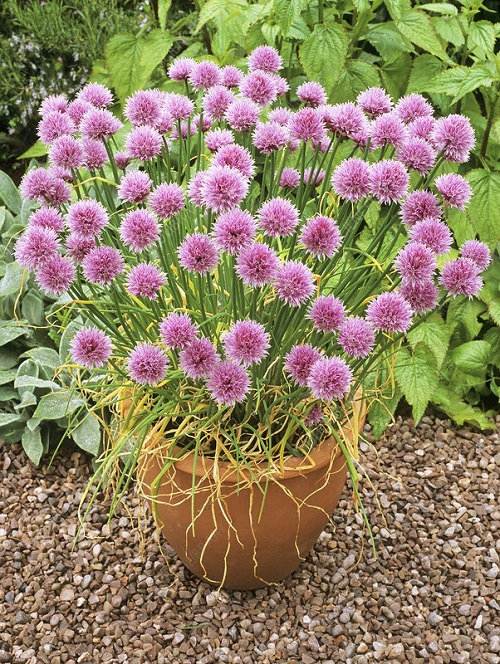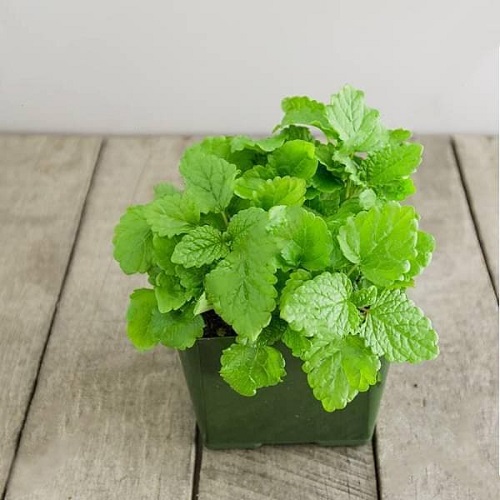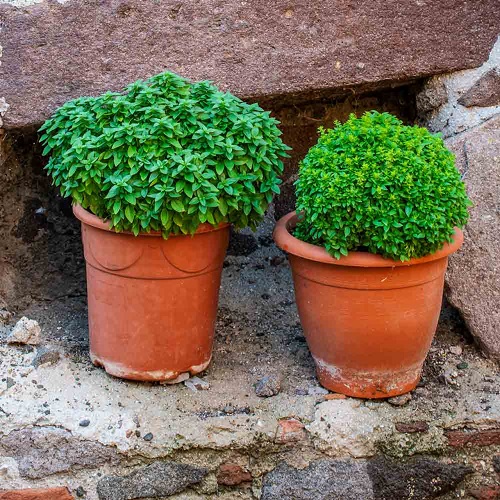Herbs with Shallow Roots are great for balconies, windowsills, and compact urban spaces, as they can grow in small pots!
Herbs with shallow roots thrive with minimal soil depth, making them ideal for small urban environments. You can grow them in tiny pots in tight spaces and enjoy fresh, home-grown herbs!
Check out Best Vining Herbs for Small Spaces here
Herbs with Shallow Roots for Small Pots
These herbs can be grown in 6-8 inches pots easily.
1. Oregano
Propagation: Root cuttings in soil or water; it roots easily.
Space Management: Compact growth habit; ideal for window sills or small containers.
Kitchen Uses: Essential in Italian, Greek, and Mexican cuisine.
Root Length: Around 4-6 inches.
Oregano is drought-tolerant and requires minimal care, making it perfect for busy individuals. Oregano is not only celebrated for its culinary uses but also for its medicinal properties, including antioxidant and antimicrobial benefits.
2. Thyme

Propagation: Propagates easily from stem cuttings planted in soil.
Space Management: Its small size makes it perfect for tight spaces.
Kitchen Uses: Versatile in soups, stews, and meat dishes.
Root Length: Generally about 5-6 inches.
Thyme is a small, perennial shrub with tiny, aromatic leaves. It’s highly regarded for its culinary versatility, imparting a subtle, earthy flavor to dishes.
3. Chives
Propagation: Easily propagated by dividing clumps or from seed.
Space Management: Ideal for narrow, deep containers.
Kitchen Uses: Enhances salads, soups, and egg dishes.
Root Length: About 4-5 inches.
Chives are known for their delicate onion flavor, making them a popular garnish in many dishes. These plants grow lovely purple flowers, adding aesthetic value to homes and gardens.
4. Cilantro
Propagation: Best grown from seeds; not well-suited for cuttings.
Space Management: Suitable for small containers; needs regular harvesting.
Kitchen Uses: Widely used in Asian, Mexican, and Indian cuisine.
Root Length: About 6-7 inches.
Cilantro, or coriander, is a fragrant herb commonly used in Latin American and Asian cuisines. It prefers cooler conditions and can quickly bolt (flower and go to seed) in hot weather.
5. Lemon Balm
Propagation: Propagate by stem cuttings or by dividing the plant.
Space Management: Prefers a little more space but can be kept compact.
Kitchen Uses: Adds a lemony flavor to teas and desserts.
Root Length: Around 5-6 inches.
As its name suggests, lemon balm has a lemony scent and a mild, lemon-like flavor. This herb thrives in well-drained soil and can grow in both full sun and partial shade.
6. Marjoram
Propagation: Easily propagated from stem cuttings.
Space Management: Compact and suitable for small pots.
Kitchen Uses: Used in soups, stews, and meat dishes, similar to oregano.
Root Length: Approximately 4-6 inches.
Marjoram is a delicate herb with a sweet, citrusy, and slightly piney flavor. It resembles oregano but has a milder and more nuanced taste.
7. Corsican Mint

- Propagation: Best propagated through stem cuttings or division
- Space Management: Needs about 6-8 inches of growing space
- Kitchen Uses: Suits in garnishes, teas, and as a flavor enhancer in desserts and cocktails.
- Root Length: Spreading about 4-5 inches
Corsican Mint, a fragrant and low-growing herb, is renowned for its intense minty aroma and is commonly used in landscaping apart from its uses in the kitchen.
8. Purslane
- Propagation: Grows from seeds or stem cuttings
- Space Management: Space plants about 6-10 inches apart
- Kitchen Uses: Salads, sandwiches, and as a crunchy addition to soups and stews.
- Root Length: Roots typically extend 4-6 inches
Purslane is a versatile and nutritious herb, often recognized for its fleshy, succulent leaves. It is a hardy plant that can grow in poor soil conditions and requires minimal care.
9. Spicy Globe Basil
Conclusion
These herbs are not only practical for their ability to thrive in small spaces but also bring a range of flavors and aromas to the kitchen. Their relatively shallow root systems, usually 4 to 7 inches, make them perfect for apartment dwellers looking to cultivate a mini herb garden.
Regular pruning, adequate sunlight, and proper watering will ensure these herbs flourish even in confined spaces.








